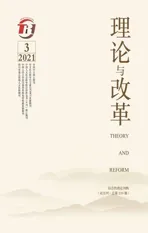英文摘要
2021-12-27
ResearchontheEffectiveCohesionbetweenRuralRevitalizationandtheConsolidationandExpansionoftheAchievementsinPovertyAlleviation:BasedontheThree-dimensionalOverallFrameworkof“Subject-Content-Tool”
WangGuomingHeLiqiong
Abstract: The transition from the victory ofthe Poverty Alleviation to full implementationof theRural Revitalizationrequires the effective cohesion between them. Following the thought of “who connects”, “what connects” and “how to connect”, this paper reveals that the effective cohesion of the two requires the linkage of multiple subjects to form a cohesive force, the coordination of five major contents to improve the quality and efficiency and the integration of multi-dimensional tools to provide a cohesive guarantee though constructing a three-dimensional overall framework of “subject-content-tool” of the consolidation and expansionof the Poverty Alleviation and Rural Revitalization. And then it systematically connect the “five subjects”, “five contents” and “three tools” to help stabilize a long-term Poverty Alleviation, alleviate relative poverty and promote Rural Revitalization.
Keywords: Poverty Alleviation; Rural Revitalization; Effective Cohesion; Poverty Alleviation Achievements; Relative Poverty; Agriculture, Rural Areas and Farmers
TheRighttoBeCounted:NewPovertyoftheDigitalCityandItsGovernance
YaoShangjian
Abstract: From industrialization to digitalization, China’s urban development and urban governance began to face the multiple transition of the industrial revolution. Digital city refers to the computability of a city. In the urban governance, digital transformation includes three stages: information adaptation governance, data application governance and algorithm leading governance. Due to the relativity of poverty, any governance that deprives capacity and rights is likely to plunge urban residents to poverty. Anti-poverty in digital city requires unimpeded technological channels for the transfer of rural population to cities, lowered digital thresholds for urban life, and urban data dividend sharing. From the perspective of urban rights, computation-based governance needs to expand the access to obtain urban rights, precaution the calculation of rights in urban digital transformation, and realize urban digital transformation from three aspects: information balance, data sharing and coexistence of difference.
Keywords: Urban Governance; Digital City; Digital; Public Services; Poverty
AdministrativePower,InformationDisclosureandGovernmentIntegrity:TheEmpiricalStudyBasedonSouthKoreanCentralGovernmentAgencies
NiXingXuFengxian
Abstract: Political practice in various countries shows that, as an agent of public power, the excessive power of government is a major cause of corruption, and the asymmetric information brought by the principal-agent relationship exacerbate the corruption further. This paper is based on 375 samples from the Lee Myung-bak (2008-2012) and Park Geun-hye (2013-2017) administrations in Korea, relies on statistical data such as the power index of south Korean government agencies and annual reports on information disclosure and adopts methods such as panel regression analysis.We discover that the level of administrative power is significantly negatively related to the level of government integrity, while the level of information disclosure is significantly positively related to the level of government integrity. Meanwhile, the degree of information disclosure plays a moderating role in mitigating the negative impact of administrative power on integrity. Therefore, in administrative reform and integrity construction, priority must be given to adjusting the types of responsibilities of government agencies, limiting the scope of administrative power, regulating the operation of power, and actively promoting the use of information disclosure system to make them truly implemented.
Keyword: Administrative Power; Information Disclosure; Anti-Corruption; South Korea
RefinedOperationofRefinedManagement:AnDescriptiveAnalysisBasedonTextandPractice
HanZhimingLiChunshen
Abstract: Refined management, a form of urban management that goes beyond extensive management, is the only way for transformation and upgrading of the modernization of urban governance, and it must be implemented through refined operation. Through the descriptive analysis of the policy text and management practice, this paper finds that although cities’ development stage, scale, and the problems faced are different, to a considerable extent, the plan and the practice of refined management in different cities are in common, especially in the six aspects of value concept, working target, main tasks,safeguard mechanism, quantitative indicators, organization and implementation, all showing the characteristic of scientific design, rational planning,striving for perfection, and elaborate operation, and they have achieved good management benefits. The transformation from extensive management to refined management can’t be achieved overnight in the intricate urban management. To achieve the refined management, we should proceed in an orderly way, constantly accumulating related knowledge and skills, so as to better promote the healthy and sustainable development of the city.
Keywords: Refined Management; Refined Operation; Extensive Management; Modernization of Urban Governance
